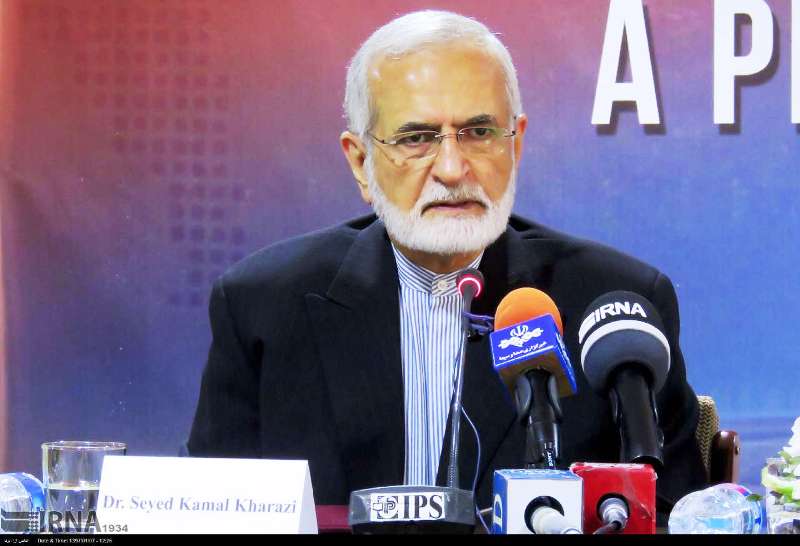
Kamal Kharazi who was in Islamabad to participate at a seminar on 'Emerging Regional and Global Scenario: A Perspective from Iran' organized by Institute of Policy Studies (IPS), expressed hope for bilateral relations between the two neighboring countries to get better.
Certainly relations between Iran and Pakistan are not satisfactory and they have to be deepened, Kharazi said responding to a question on the current ties between Tehran and Islamabad.
“There are difference of views and policies and those differences should not keep us away for understanding and to plan more cooperation, no doubt that Iranian and Pakistani people have very close relation but there should be more political cooperation,” the former Iranian foreign minister said.
“We hope that with the recent visits of officials from both sides the ground will be prepared for practical steps for much deeper relations between the two sides,’ he added.
Kharazi said that Iran is a secure place despite being located in an area which is full of crisis and it is because the sacrifices made by the Iranian people. He said that for Iran, the US and Zionist regime are the same thing.
He also said that some countries have invested a lot in Afghanistan to promote a Sunni insurgency to fight forces of the former Soviet Union.
But the insurgency spilled over to other places in the region in an unending process until the Syrian crisis, he said.
“The same countries invested in Syria to support terrorists,” he added.
The expert on international affairs said Daesh (ISIS) was created to counter the Islamic Revolution. He expressed regret over attempts by some countries in the region aimed at countering the Islamic Revolution by supporting the Takfiri and terrorist groups which have been source of many crises and killings.
Shedding light on the developing situation in Afghanistan, Kharazi termed the involvement of Taliban in Afghanistan government necessary, saying that any such development will invalidate the legitimacy of the US longer presence in Afghanistan.
He stressed that Iran and Pakistan should join hand and work together in this regard as both countries have suffered extensively from the issue.
The US on the other hand, he argued, would want to extend its presence in Afghanistan as much as possible because this will help it keeping an eye on China, Russia, Iran and Pakistan.
Kharazi, elaborating on the relations between Tehran and New Delhi, said that any cooperation between Iran and India can never be against Pakistan.
Much the same way, no Pakistan alliance with Saudi Arabia can be made against Iran, he added.
He said that every country operates to serve its own interests and that Iran's increasing relations with India were not going to hurt Pakistan in any way.
Kharazi said that Pakistan and Iran enjoyed cultural, religious, geographical and historical ties and even their interests were not much dissimilar from each other.
It was thus necessary for the deep-rooted relations to be promoted to include the economic ones, which would provide significant momentum for the region's economic growth.
The linking of Gwadar and Chabahar Port city was termed an important step by the Iranian former foreign minister that should be taken into regard.
Speaking about some of the disagreements between Iran and Pakistan, he said that none of those issues were very serious in nature, hence they should not be reflected on the policies of either country, Kharazi said.
Answering a question on foreign pressures on the Iran, he said that Iran is accustomed to outside pressures, including those from the United States and therefore we will continue our policy of trying to stand on our own feet.
You should not depend on others, he stressed.
Talking about the status of the Iran nuclear deal, known as the Joint Comprehensive Plan of Action (JCPOA) and US President Donald Trump's approach towards the international agreement, Kharazi said that though Iran is still committed to the deal, US is trying to walk away from it and that Washington has already started the process of violating the accord.
He said that the options for Iran are still open in case of US violation.
European countries, though, are still keen on keeping the deal intact, he added.
The head of Iran's Strategic Council on Foreign Relations also explained the reasons behind the Iranian support for Bashar Assad's government in Syria, saying that Iran helped Damascus to abort a plot by Israel aimed at dividing Syria by using Daesh.
He argued that such a situation will not be to the interest of the Islamic world.
That explains why Iran keeps questioning Saudi Arabia and other powers' support for US regarding the issue, he said.
Any division of Syria, if happened, would affect Iran; naturally Iran decided to support Assad, Kharazi said.
For Iran, the issue was not about the Shia-Sunni divide as the country was already working with Sunnis in Afghanistan, Pakistan and Palestine, he added.
Answering a question on the so-called Saudi-led coalition, he said that it was just a name and not a real coalition.
“We believe that Pakistan acted in a right way not to get involved in such operation [against the Yemeni people] and we hope that after three years of destructions and killings [in Yemen] Saudi Arabian government will come to realize that the policy it is following is a wrong one,” he said.
He said that Iran is always ready to engage with all parties, including Saudi Arabia to bring peace and stability in Yemen.
The session was chaired by Shamshad Ahmed Khan, former Foreign Secretary of Pakistan. The event was attended by a number of former diplomats, former secretaries, academicians, intellectuals, as well as Iranian ambassador to Pakistan Mehdi Honardoost and other officials from the Iranian embassy.
272**6125**2044
Follow us on Twitter @IrnaEnglish
 solhkhabar | Peace International News Agency Peace International News Agency , Peace News , International Agency News of Peace
solhkhabar | Peace International News Agency Peace International News Agency , Peace News , International Agency News of Peace